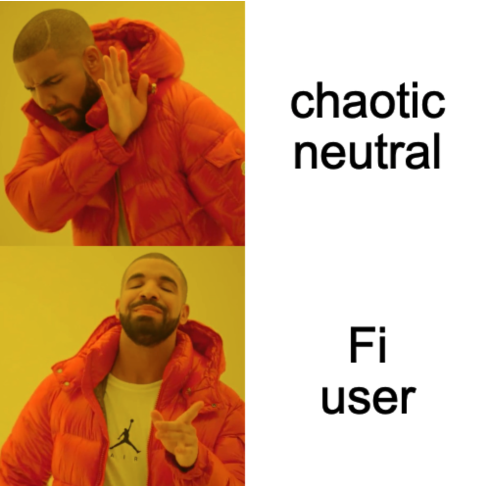#introverted feeling
Taken from this article.
1. Authenticity Is Extremely Important to You
You are determined to be “real” and honest in the way you live your life and interact with other people. Phony social niceties and small talk drive you crazy. When you spot insincerity from other people it’s an instant turn-off.
2. You Get Gut Feelings Pretty Quickly That Something is Right or Wrong
You don’t always know where these feelings are coming from, but you get a strong “intuitive” hunch when something is out of line with your ethics and values. You become anxious and might even feel sick if you do something that goes against your values.
3. You’re Private About Your Emotions
Someone has to earn your trust in a big way before you’ll share your deepest feelings and values with them. You hate when you cry in front of people.
4. You Are Individualistic
You don’t really care so much what society or culture says you should look like or dress like. You like having your own unique tastes, styles, and preferences that feel true to you.
5. You Don’t Want to Force Your Values on Others
Everyone has a right to their own unique set of values. Unless someone is hurting someone else or being a bully you don’t feel comfortable asking other people to conform to your set of morals and ethics.
6. On the Outside You’re Easygoing. On the Inside You Have Strong Convictions
To others you might seem tolerant, open-minded, and accepting. On the inside, however, you hold yourself to a strict set of morals and core beliefs that you strive to remain true to no matter what opposition you face.
7. You’re Not an Open Book
Even if you are friendly, sociable, and outgoing, there’s a part of yourself that you tend to keep private and internalized. Some people might call you “mysterious” or “enigmatic.”
8. You Dislike Critiquing People and Being Critiqued
Who you are is not for someone else to judge, and you feel uncomfortable judging other people or evaluating their performance. You feel like everyone has their own unique gifts to bring to the table and it doesn’t feel right to make judgments about how they do things unless it’s hurting someone else.
9. You Crave Freedom
You dislike conforming to a set of rules and structures that have been made by someone else. You love traveling, exploring, experimenting, and being independent. You hate being controlled or trapped.
10. You Can Instantly “Step Into Other People’s Shoes”
You’re good at picking up on emotions and other people’s feelings, especially one-on-one. You may even notice how others are feeling before they do!
example of being a thinker (and maybe especially fi polr)
is watching a video like this
then thinking something like this:
“these people keep crying how poor they are (and i’m sure it is terrible) but then they make 3-4 kids (optimistic much?) so they can suffer too… they believe "god will help us” or something like that. then they get shot by a bullet in a gang ruled slum, then they blame government.
as opposed to feeling something like this:
this guy is so inspirational, so much respect for him, he loves his parents, he fought against all odds etc.
…
because as a thinker with fi polr i further think this:
he is an exception. so what if one guy succeeded? what about all the OTHERS (fe) failed? how can i ignore all those people getting rekt and then just feel for this one guy positive things?
Today, there are an estimated 1,000 favelas in Rio, and they are home to about 1.5 million people
I have seen some pretty dark times. I have been walked over, cheated on, taken for granted and abused. I have cried myself to sleep several nights. I had been all alone when I desperately needed someone to tell me, “I love you”.
All through this I learnt that, nobody matters than my own self. I learnt to cradle my own self when I needed it. I learnt to say “I love you” to my own self.
Now, no matter who you are, I am more important to me than you. I will always choose myself before everyone else. Because, I only have me and I am the person I love more than anybody else in the whole world. I no longer “need” anybody to add love to my life. I already have love and compassion in abundance.
I shall always choose myself and choose to live a life that is authentic to my own heart.
Developing introverted feeling as an ENFP
Introverted feeling has always been a mystery, and difficult to understand function to me. The more I searched about it, the more confused I got. All the information sources I came across explained it as ‘moral code’ but did not give a practical solution to master it.
I will try my best to elaborate Fi based on my personal experiences. Fi is all about you understanding your own self and shaping your personality. Consciously choosing who you want to be as a person.
Developing your Fi is not as easy job. It requires lot of patience, you have to spend a lot of time alone with yourself, thinking, analysing and understanding your emotions and feelings. You have to evaluate your past decisions. You have to ask loads of questions from your own self and dig deeper into yourself until you get a satisfactory answer.
For an ENFP, it is easier to skip and avoid developing Fi, but it is vital for a satisfactory life.
Developing Fi will require you to come out of your comfort zone and embrace yourself for who you are.
I will further elaborate this with examples from my own life.
Once I got an opportunity to write to a magazine at my university and I was so hyped up about it, at the time I got to know about it. But the next day when I actually had to get into writing, I just couldn’t do it. I kept tossing around, ruminating in my mind, whether I should write or not, for hours, giving various reasons to myself. In the end, I did not write and neither accomplish anything in that time. Finally I had to confront myself. Sit with me, question myself and realized my very reason for postponing it is fear, and lack of confidence. Identifying this was a moment of “Eureka” for me.
In the above incident, it would have been easier to shove everything under the carpet and totally forget about the magazine. But I went through the pain of understanding my emotions and behaviour.
This is what developing Fi is about. With each revelation you will unearth a layer of your true self.
Alongside this, the process of recognising your morals will occur.
Morals are personal and unique to every ENFP. Recognising them and shaping yourself accordingly is another part of this process.
Picturing this process with an example; recently I discovered my greed for money. I have developed (or maybe inherently had) a desire to possess as much money as possible. But I do not want to be a person who is greedy for money and wealth. I want to be a person who acts based on passion rather than being focused on money. That is one of my moral codes. Conquering this demon of greed is a process. I am yet to achieve it.
Similarly, the journey of uncovering and conquering your demons and inner-enemies are yours alone.
A journey towards your own betterment.
Manipulators seek to dominate and control your decision making, see Manipulative Behavior for more detail. Some common examples of manipulative tactics:
Si: throws past issues/mistakes at you
Ni: uses knowledge of you against you
Ti: gradually chips at your self-esteem
Fi: twists your sense of loyalty or morality
Se: evades, distracts, makes excuses
Ne: empty promises, tries to confuse you
Te: shuts down discussion/disagreement
Fe: exploits your emotional vulnerabilities

Mrs. Peacock: Extraverted Feeling (Fe)
Mrs. Peacock is determined that everyone have a good time, despite the mysterious circumstances of their invitations, and breaks the ice with dinner conversation to cut through the silent awkwardness. She’s a great hostess, a skill she used to throw parties that kept her husband socially connected with the right people. She depends on appearing socially respectable, expressing disgust at Green and Plum’s alleged sexual deviancy while denying her own crimes. She’s loud and expressive with her feelings, and constantly blurts out things she shouldn’t without thinking. When the Evangelist comes to the house, Peacock rushes to hurry him away, for fear that he will become another victim in the rash of murders.
Best Suggestion: ESFJ

Mrs. White: Introverted Feeling (Fi)
Mrs. White is seething with rage from within—flames on the sides of her head!–but you’d never know it to look at her cool, icy exterior. She’s vain and self-absorbed and believes men should be as disposable as Kleenex, tossed away when she’s done with them. She feels no remorse after the death of her husband, just happiness at having her own life back. She recognizes Yvette as the woman who cheated with her husband, but denies she was jealous. In fact, she hated Yvette and waits for the right opportunity to strangle the life out of her.
Best Suggestion: ISFP
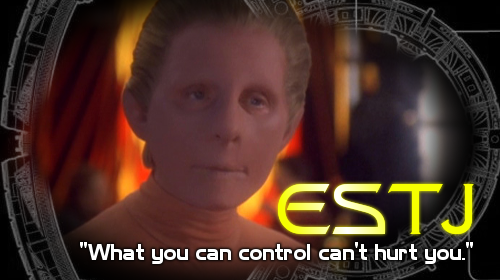
ESTJ – the Director, the Achiever, the Optimizer
When we type a villain, we usually expect their inferior function to be their fatal weakness. For Te-doms, the stereotype is that they have no moral oversight to their actions. By contrast, the intimidating Founder has a very clear moral vision–she believes she is absolutely entitled to wield control over other, lesser species.
Another of DS9’s ESTJ villains, the meddling Brunt, acts the same way. He enforces the laws of Ferengi society with an aggressive sense of justice. Just like a weak inferior-Te user might use faulty logic to defend their subjective beliefs, inferior-Fi can provide the comfort of self-righteousness to an over-controlling ExTJ.
(This character was never given a name on the show. Instead, she was referred to in dialogue and in the credits as simply, “Female Changeling.” That’s super clunky and annoying to type over and over, so for simplicity’s sake, I’m just calling her “The Founder.”)
Dominant Function: (Te) Extraverted Thinking, “The Workshop”
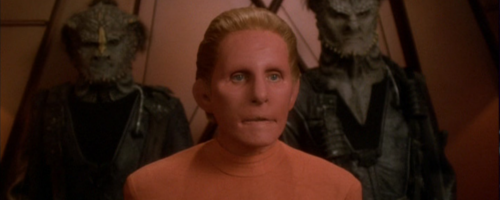
The Founder’s major directive is to bring every civilization she meets under the control of the Dominion. She sees it as her calling to bring order to a galaxy racked with chaos. Solids, she believes, don’t know enough to govern themselves, and so the Founders must lead.
The Founders exert control over their realm through their minions, the loyal Vorta and Jem’Hadar. Both races are genetically engineered to be obedient without question, and to view the Founders as gods. For further control, the Jem’Hadar are engineered to be addicted to a drug called Ketracel-white, which only their “gods” provide.
The Founder is supremely confident and implacable even in the face of setbacks. She always believes the Dominion will succeed, and repeatedly tells her enemies how doomed to failure their efforts are. She’s completely intolerant of failure and incompetence, and grows more demanding with her subordinates as the war drags on.
Auxiliary Function: (Si) Introverted Sensing, “The Study”
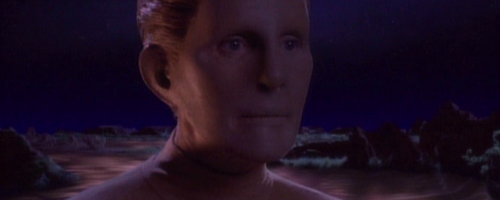
Millennia ago, Changelings were hunted down by solids who feared and distrusted them. The survivors formed the Dominion, and began conquering the solids in an effort to ensure that they were never persecuted again. The Founder sees all non-shapeshifters through the lens of this story, and won’t accept them as anything other than dangerous, small-minded brutes.
She finds existence as a humanoid limiting compared to the way she lives when she’s at home in the Great Link. Though she describes the Link to Odo in abstract terms, I don’t think this puts it outside the realm of sensory experience. Si, because it’s personal to the user, can feel abstract and hard to describe, like any other Introverted function.
Odo’s Si-experience is usually of being in one form, while The Founder has been many different shapes and beings over the centuries. She can replicate anything or anyone down to the last tactile detail, and shares the experience of all the other Changelings she’s with in the Link, who have also taken many forms. Thus her life experience is multi-faceted and expansive, and she very naturally feels that she is wiser and has more understanding of the universe than solids trapped in one form. That she refuses to consider their perspective until Odo links with her betrays the hidden rigidity of her thinking.
Tertiary Function: (Ne) Extraverted Intuition, “The Hiking Trails”
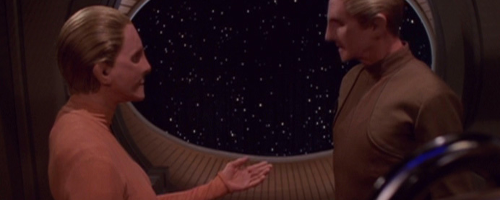
The Founder takes pride in being a shapeshifter, and gets bored and frustrated having to stay in the shape of a humanoid for too long. She pushes Odo to think outside the box (or bucket) of his bipedal existence, to experience the essence of different objects and lifeforms. She uses language that sounds mysterious and abstract to him as she describes life in the Great Link, hinting that she may be not so much an individual, but a “drop” of the Great Link that “becomes the ocean” when she returns.
On the other hand, the Founder’s ideas of humanoids have solidified, if you will, and she will not be moved in her perception. She tries love-making in the humanoid style, and is not impressed. When she’s infected with a wasting disease by Starfleet’s secretive Section 31, this only confirms her cynical view of humans. As her war efforts begin to fail, she begins to loop, ordering the swift execution and re-cloning of her Vorta scientists to provide a fresh perspective on their work to cure her.
Inferior Function: (Fi) Introverted Function, “The Deep Well”
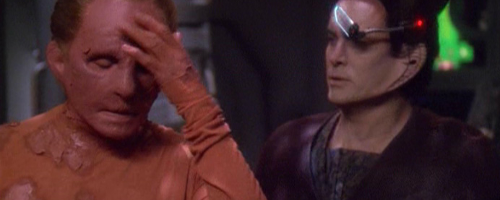
The Founder pursues her mission to dominate the galaxy with an air of moral superiority. She believes that Changelings are a higher life-form than all non-changelings, giving the Founders the right and duty to conquer. She needs allies like the Breen and the Cardassians to build her forces, but she still views them with disdain, and will manipulate them to serve her purposes.
Her greater mission, beyond conquering the Alpha Quadrant, is to bring Odo home. She’s tender and patient with him, repeatedly inviting him to return to the Link. She and the other Founders feel forced to punish Odo for breaking their one rule—that no Changeling ever harms another Changeling—but once his time is served, she once again entreats him to join their ranks. Though he has chosen life with the solids, she assures him that he will always be a Changeling in the eyes of his people.
The Founder grows testy as the infection breaks her down, and the Alpha Quadrant refuses to surrender to her will. She denies her condition at first, not wishing to show weakness, but then she stops caring how anyone sees her. She bullies, criticizes, threatens, and abuses her subordinates. She orders mass executions of Cardassians to punish the insurgent movement, and then orders the whole planet wiped out when it looks like the Dominion has lost.
When at last Odo links with her, sharing the cure for her infection as well as his more tolerant perspective on the solids, the Founder surrenders. She signs a peace treaty to end the war, and voluntarily submits herself to imprisonment for her war crimes. Even so, she keeps her head held high.

ISTJ – the Inspector, the Steward, the Trustee
Eddington undergoes a major character switch when he becomes a villain. After a couple of years serving quietly in the background, he jumps ship (or station, as it were), and goes rogue. He’s more aggressive and dramatic as a crusading Maquis than he was as a law-abiding Starfleet officer, leading me to believe he’s operating out of his lower functions when he makes the change. Eddington sees himself as the hero of his own story, but to Starfleet and Sisko, he’s a terrorist.
Dominant Function: (Si) Introverted Sensing, “The Study”

At first, Eddington seems like a good old-fashioned, reliable Starfleet officer. He joined with the ambition of being a captain, like everyone else, but ended up in security. That department doesn’t typically lead to command, but he still stuck to his job and did it well. Sisko asks him why he doesn’t just transfer over to the command division, but Eddington doesn’t seem interested in a big change at this point.
Of course, that could just be because he has other things brewing.
Eddington eventually reveals himself as a leader in the Maquis, a terrorist group dedicated to protecting Federation colonists left behind in Cardassian territory after new borders are drawn. The Maquis, and Eddington, don’t believe they should have to leave their homes for any reason. Though they’re offered many alternatives, they hold their ground and refuse to leave no matter how poor their living conditions grow.
Eddington appreciates the real, hand-grown, fresh food he raises and eats as a Maquis. He doesn’t like the taste of replicated food, and recognizes the exact menu selection he’s given as a prisoner. His whole existence as a Maquis feels more natural to him than his outward presentation as a Starfleet officer.
On the run from Sisko, Eddington relates their entire cat-and-mouse game to his favorite book, Les Miserables. He’s the persecuted Valjean, and Sisko’s the obsessive Javert. He makes Sisko read the book to understand his perspective—and Sisko plays along, doing all the villainous things Eddington expects of him until Eddington surrenders.
Once the Maquis are wiped out by the Dominion, Eddington feels he has nothing left to lose. He grows nihilistic and cynical and sits around waiting to die. Sisko tests his death-wish, and Eddington comes around long enough to help him out on one last mission.
He keeps a family heirloom, a two-hundred-year-old “Lucky Loonie” coin from Canada, as a good luck token, though he seems to have left it behind when he defected.
His last word when he goes out in a blaze of glory is the name of his wife.
Auxiliary Function: (Te) Extraverted Thinking, “The Workshop”

Eddington is originally assigned to DS9 to provide greater Starfleet control and influence over security operations. This means getting in Odo’s way a lot, although he means no hard feelings about it—it’s just his job. He has the same attitude when he sabotages the Defiant under orders from a Starfleet admiral. He’s just doing his duty, stopping the Defiant from carrying out a mission they were ordered not to do, and he’s very careful not to cripple the ship entirely. Once O’Brien fixes the sabotage, Eddington actually continues serving on the bridge, dutifully fulfilling his function.
Eddington self-sacrificially performs his service as an officer, which probably leads to his discontent over the years. He promises to Sisko that he’s willing to escort a high-ranking ambassador off the bridge against his will if his duty calls for it. He stays behind in the Defiant’s Engineering to help Jadzia prevent a warp core breach even though he’s badly burned—in fact he’s the last officer to leave the scene after the problem is fixed.
Despite his apparent low-key nature, Eddington admits upon Sisko’s promotion that he is a man obsessed with rank and title. When he defects, he in effect gets his own promotion, going from humble security officer to a sort of general in the Maquis, a man respected and followed by many. He feels personally responsible for not being there to lead his people when they’re attacked by the Dominion.
Eddington engineers a masterful heist when he defects, making off with a shipment of industrial replicators for the Maquis, while diverting suspicion, and the crew, to Kasidy Yates.
Tertiary Function: (Fi) Introverted Feeling, “The Deep Well”

Even Sisko admits once he’s gone, that although Eddington was a traitor to Starfleet, he was loyal to what he believed in. Eddington sees the Maquis’ cause as noble and pure, and anyone who opposes it as on the wrong side of the fight. He feels no guilt for the civilian ships or populations they destroy, as he has a very similar stance to Kira’s “all Cardassians (or Starfleet officers) are guilty” speech.
In his Starfleet life, Eddington pretends to have no strong conviction about the Maquis. Just before he springs his trap, he still claims to be solely devoted to his Starfleet duty, only chasing down Maquis because that’s his assignment. Everyone believes him because that’s just the kind of guy he is.
Strangely, Eddington introduces himself when he first arrives on the station as “here to make friends.” Not a typical Fi-user statement, but he really does seem to be a simple, friendly person who wants to do right by his job—and that means being friends with his co-workers. After he defects, he accuses Sisko of being driven by ego, but it’s hard to deny that Eddington seems to have gotten a little worn out with playing nice and normal all the time.
Extraverted Intuition: (Ne) Extraverted Intuition, “The Hiking Trails”

Eddington’s clever and wily, and anticipates every contingency for his heist, planning an escape route and leaving bugs in the computers. He pretends to have no desire to leave prison to help Sisko, waiting until he’s dragged out of jail to go on the mission, just so Sisko won’t suspect that he actually wants to go so he can see his wife again. And he’s plenty creative in his old job too, like when he problem-solves in the moment by beaming the crew into holosuite characters after a transporter accident.
Eddington explains that he was once loyal to the uniform like Sisko, but he began questioning everything he believed after seeing the Federation’s treatment of the Maquis. He dramatically compares the Federation to the Borg, who assimilate others and expect everyone to play along. He aggrandizes his crusade, playing up his own mythos and tragedy, and Sisko calls out his ambitious desire to lead soldiers in glorious, doomed battle.
Eddington gets what he wanted in the end, dying in a flurry of enemy weapons fire while defending his people, fulfilling his fantasy of martyrdom.
(My main theory for Eddington is that he lived dutifully out of the top of his functional stack for most of his life, before the stress of seeing his home abandoned and abused forced him into his lower functions as a response. You could read him just the opposite, I suppose, as a meek Perceiver who was just waiting for the right cause to be a crusader. His Fi seems more strident to me, though, in a way that I’ve seen in other ISTJs who hit upon a sudden moral realization about something late in life.)

INFP – the Healer, the Dreamer, the Clarifier
Keiko O’Brien put up with a lot, and never really got her due. She joined the crewway back in TNG, then left her career to cross over with her husband Miles to DS9, highlighting the show’s themes of family life and diversity. Once the focus shifted to the O’Brien-Bashir bromance (which, to be clear, I think is wonderful), our intrepid botanist went neglected.
Most of her episodes catch Keiko on her bad days, bickering with her husband or worrying what to do with her life. It was tough deciding whether she was always in the grip, or just aggressively using her higher functions. When we see her on good days, she’s obviously smart, sweet, and crazy in love with an Irish engineer who’s as stubborn as she is.
Dominant Function: (Fi) Introverted Feeling, “The Deep Well”

Keiko and Miles love each other deeply in a way that’s obvious to everyone, but also a little inexplicable given how often they seem to be at odds. They clash in the hard-headed way of two Fi-users exasperated with constant compromise. His Fi is lower, so he has trouble working out how to emotionally respond, while her higher Fi wants to be understood without having to explain itself (as an INFP who has dated two ISTJs, I can assure you this never happens in real life…ahem).
Their marriage isn’t easy, but it’s interesting to note that Keiko never brings up the option of separation once she’s committed to Miles. She’s mama-bear protective of her husband and kids on the multiple occasions when various outer space phenomena threaten them, as they do often to Starfleet types. She argues loud for her husband’s innocence when he’s unjustly accused by the Cardassians, and she has a gut feeling that he’s still alive after he’s apparently killed. She has to hold in her feelings when interacting with Miles’ imposter, but the creepiness proves overwhelming, and she makes excuses to get away.
Keiko will stick to what she believes outside of her family life, too. She feels that the kids on DS9 need education, so she starts a school. Vedek Winn tries to shut her down for teaching the scientific explanation about the wormhole without the religious story, but Keiko refuses to budge. She takes in a Cardassian war orphan, and pulls her husband aside during dinner to confront him over his bigoted behavior toward the boy.
They may sound argumentative to those outside the O’Brien household, but Miles declares that Keiko is the most supportive person he knows. When Lwaxana’s telepathic illness causes various members of the crew to randomly fall in love with each other, nothing happens to Keiko and Miles. The others were affected because of latent attractions they held unconsciously, but the O’Briens’ internal compasses point only at each other.
Auxiliary Function: (Ne) Extraverted Intuition, “The Hiking Trails”

Keiko is willing to pick up and move their family to DS9 for the sake of Miles’ career, and after a few weeks of boredom, she finds something productive to do and throws herself into the project. She protests Vedek Winn’s intrusion into her classroom because she sees her job as opening the minds of her students and exposing them to new and diverse ideas. When her unborn child has to be transplanted into Kira after an accident, Keiko just rolls with the new situation, inviting Nerys to live with them during the pregnancy and learning the Bajoran birthing ritual.
When we first meet her, Keiko’s freaking out over her impending marriage to Miles. She backs out, then re-commits, changing her mind virtually every few hours. She knows she loves Miles, but she’s anxious about making the right decision for her life.
This is the frustrating thing with Fi+Ne. Every types’ functions push and pull against each other, particularly when they’re far apart in the stack. It’s how the MBTI model explains the inner contradictions we all have, and helps us to grow. But even our top two functions, the ones that turn us into stereotypes if we only work from them without our lower half, can conflict with each other. Fi, in my INFP experience, is often the most rigid of the functions, while Ne is the most changeable.
Living with these two functions tag-teaming each other at the top of your stack gets exhausting.
On the one hand, you want to stick with the position you know is right, but on the other hand, you’re compelled to always be hunting for unexplored options. So while Keiko looks like a crazy person to her husband, I can completely sympathize with her frustration. She wants to support Miles in his career, but she needs to have her own opportunities to pursue.
Being a stay-at-home mom doesn’t work for her (particularly in an advanced future where there’s not much housework). Being a schoolteacher fulfills her for a while, but then that well dries up. Miles tries to build her a small arboretum where she can work with plants in her spare time, but botany isn’t her hobby—it’s her vocation.
Keiko needs to be a botanist. She joins a Bajoran expedition to explore undocumented species on the planet, and then she’s continuously gone on missions for most of the rest of the series. It’s a constantly moving, always changing lifestyle, and it seems to be the best choice she ever made.
Tertiary Function: (Si) Introverted Sensing, “The Study”

Keiko gets bored with routine. She assures Miles she’s okay sitting in their quarters when he leaves for work, but she needs something to engage her interests and skills. Still, she values her home life, and after months of traveling for work, she feels relief at coming back where she belongs. She keeps many traditions, especially food, from her Japanese heritage, and her wedding to Miles is a tasteful mix of Japanese and Irish customs.
Keiko gets help from a telepath to help her recollect the details from a certain childhood memory. She has various pieces—images, textures, a piece of a song—but she can’t quite recall why it’s important to her. The experience brings her memory into focus, and she finally remembers time spent with her grandmother doing calligraphy.
Keiko believes that footage of her husband’s death has been faked, because it shows him drinking coffee in the afternoon, and Miles never drinks coffee in the afternoon. Her certainty sends Sisko and the crew off on a whole investigation, and sure enough they discover Miles (and Julian) still alive and on the run. When she gets him back, Keiko discovers that she’s mistaken—Miles drinks coffee in the afternoon all the time (cue laugh track, freeze frame, end credits)!
Inferior Function: (Te) Extraverted Thinking, “The Workshop”

Keiko can put her foot down, and often does, leading to stand-offs with her Te-aux husband. She rises to the occasion when she decides the station urgently needs a school, planning and scheduling the curriculum and persuading Sisko to give her the space for it. She even gets Rom on board, convincing him that education will be good for his son.
And let’s not forget she managed to give birth to Molly in the middle of a ship-wide disaster.
(In the not-strictly-canon post-TV novels, Keiko takes a job after the war helping Cardassia regrow its biosphere, and then it’s Miles’ turn to give up his career for his partner. I think it’s a lovely development, bringing the O’Brien family full circle.)
Originally, I didn’t think I would be able to fully type Keiko, and I intended to include her in a quick list of supporting characters. While writing the list, I argued myself into an INFP typing. Back in the TNG series, I ended up typing another troublesome Star Trek character as an INFP, and I’m hoping this doesn’t reveal some sort of bias. I have no deep personal connection to Wesley or Keiko, so I don’t think I’m projecting my own type onto them. If I had to guess, when the show requires a character to act one way this week and another way next week, that Fi-Ne combo seems like an easy explanation.
As always, I welcome input and opinions.
Rosalind Chao certainly deserved better, so catch “The Assignment” from Season 5 to see her absolutely owning the episode.

ISTJ – the Inspector, the Trustee, the Steward
When typing the Vulcans of The Original Series, I observed that most of them are ISTJs. The orderliness, logic, and composure commonly associated with the type just suits them. Turns out our two favorite Klingons are also Si-doms, and Worf and Martok find ways to tear apart their types’ expectations with a fury.
Dominant Function: (Si) Introverted Sensing, “The Study”

Martok has worked long and hard to get where he is. He comes from a lower-class, “commoner” background, and never forgets it. He was the first in his family to apply for officer training, but he was rejected thanks to a negative vote from the legendary Kor, who believed that those without noble blood should not be allowed in the ranks of officers. Martok holds this against Kor for the rest of his life, and refuses to speak to the man when he joins his crew for one last mission.
Martok had to work as a common day laborer due to his rejection, but he never gave up his original plan to become an officer. He served as an orderly on a Klingon warship and finally earned a field commission from his General when they fought invading Romulans. Sadly, Martok’s father had died by the time he accomplished this, and Martok carried that sore spot with him as well, nursing his grudge against Kor.
Over the years, Martok became an experienced and skilled strategist. He rose through the ranks and attained the position of right-hand man to the Chancellor himself, Gowron. He was briefly replaced by a Changeling, and spent at least a year in a Dominion internment camp.
During this imprisonment, Martok loses an eye in one of his daily sparring matches with the Jem’Hadar. He also loses his edge, and worries that he’ll never set foot on a Klingon ship again. Once he’s free, he feels that his captivity has dulled his senses.
It takes a while for Martok to get his footing and his old instincts back. He decides not to replace his missing eye, keeping the scar as a badge of honor, to remember what the Jem’Hadar did to him. He also keeps his fear—very un-Klingon of him—believing that due to his past experiences, only he truly understands and appreciates the danger that the Jem’Hadar represent.
He takes command of an old Bird-of-Prey called the Rotarran, whose crew is beat up and defeated, and can’t shake off his own malaise. He’s looping a bit, afraid of facing his fears by encountering the Jem’Hadar again. It takes a butt-kicking from Worf and a few successful battles under his belt for Martok to feel like his old warrior self again.
Even as Martok gains status in the Klingon Defense Force during the war, he keeps the Rotarran as his flagship based on the memorable victories he won with it and its crew.
At the end of the war, Worf deposes the reckless Gowron and installs Martok as the new Chancellor, based on his years of experience and service. Martok balks at taking the mantle, as he’s never forgotten the humble roots he came from. He’s a common Klingon warrior. To Worf, that makes him the perfect leader.
Auxiliary Function: (Te) Extraverted Thinking, “The Workshop”

When Martok first takes command of the Rotarran, he’s looping, and out of touch with his Te. He uses it ineffectively and bluntly, much like someone in an inferior Te-grip, demanding compliance with unclear orders, bullying and berating his crew, and threatening them with charges of treason if they question him. He’s deeply disappointed at the poor service record of the ship and crew, as they have grown incapable and defeated after months of losing battles.
Worf challenges Martok’s command competency, and the two of them duel on the bridge. Worf almost bests him, but he sees the fire return in Martok, and he lets him win. Now Martok feels like a commander again, and he pulls the crew together for a victorious fight.
Martok’s still a strict disciplinarian, though. He throws a subordinate off the upper level of the Promenade just to teach him a lesson, and almost gets locked up in the station’s brig for it. Worf argues to Odo and Sisko that the General is perfectly within keeping of Klingon disciplinary structures, and they let him off with a warning.
When Nog stands up to Martok and his unruly men, Martok marvels in the little Ferengi’s show of confidence, and gives him respect—and space—from thereon.
While still a traditional Klingon, Martok isn’t as caught up in the formality of ritual like the ISFJ Worf. They’re both Si-dom, but with different Extraverted Judging functions in the auxiliary position. Martok lets Worf go through the motions of the chants and songs as the Rotarran launches, but he really just wants to get on with the job.
Once Martok becomes the liaison between the Klingon forces and Starfleet on DS9, he finds to his dismay that his job involves a lot of paperwork. How’s that for a non-stereotypical ISTJ? Martok prefers direct action, not busywork behind a desk.
When they make it to Cardassia in the final push against the Dominion, Martok’s Starfleet and Romulan comrades stand dismayed at the destruction. Martok, however, wishes to celebrate the victory with bloodwine. This is satisfaction for a job well done.
Tertiary Function: (Fi) Introverted Feeling, “The Deep Well”

Martok discovers a special bond with Worf during their imprisonment. It’s a moment Worf describes as tova’dok, a kind of spark of understanding between warriors. Martok coaches Worf to keep fighting during their imprisonment, and later appoints him his first officer on the Rotarran based on the trust they’ve built.
Eventually, Martok adopts Worf into his house, letting him take the name of Martok and regain his social standing in the Empire.
Martok has a fiery relationship with his wife Sirella, a majestic, formidable ESTJ. No one can quite understand how they work, not even Martok himself. He only knows that as tough a warrior as he tries to be, his honor leaves him lonely without someone to share his victories with.
Martok won’t let go of his grudge against Kor, and initially refuses to explain his emotional reaction to the Dahar Master’s presence on his ship. It is a matter of personal honor (whereas Worf, the Fe-user, is typically concerned with the honor that others will see). Even seeing Kor lose his honor as his mind deteriorates doesn’t satisfy him. After Kor goes out in a blaze of glory, Martok salutes his victory, but will not sing along with the other warriors in his honor.
Inferior Function: (Ne) Extraverted Intuition, “The Hiking Trails”

As a young warrior, Martok hoped for a better position in life than what he was born into, and fought to attain the rank of officer, which by all past tradition should have been out of his reach.
When he returns to command after his imprisonment, Martok has developed fearful and paranoid anxieties about the enemy he faces. Overcautious, he repeatedly orders the ship away from possible confrontation, citing various negative outcomes if they try to engage the Jem’Hadar. He grows pessimistic about the possibility of success, deciding without evidence that there can be no survivors on the ship they’ve come to find. He’s distrustful of his crew, and most of all himself.
To be a warrior again, he has to embrace the unknown possibilities of striking out into battle. Afterwards, he offers Worf a new beginning by becoming his brother.
When he’s being tended to by Doctor Bashir for battle training injuries, he gets fed up with Bashir’s worry. An inch or two this way or that, and Martok could have lost another eye or severed an artery. The old Klingon grumbles: “The human fascination with what might have been grows tiresome. The artery is not severed, and I am not dead.”
Martok is very much alive, despite everything, at the end of the saga. In fact, he’s wearing the robes of Chancellor of the Klingon Empire. It was not an outcome he expected, but it is a chance for the Empire to renew itself after generations of corruption.
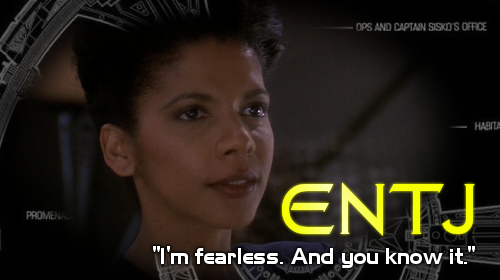
ENTJ – the Commander, the Field-Marshall, the Trailblazer
With the introduction of Kasidy Yates, yet another Extraverted Judger type entered Ben Sisko’s Fi-dom life, challenging his comfort zone. Kasidy and Ben are my favorite couple in all of Star Trek, and it’s frankly impressive and encouraging that these two disparate personality types make such a great pair. They confound each other at every turn, and yet every scene they play together strikes sparks. They seem to enjoy the mystery that is the person they love.
Dominant Function: (Te) Extraverted Thinking, “The Workshop”
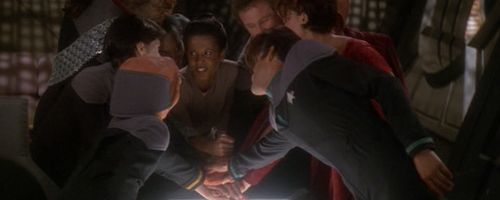
Kasidy is captain of her own ship, the Xhosa, which she runs under the company she founded—Kasidy Yates Interstellar Freights, the rhymingest name for a business in all of Star Trek. Since humans live without money in this future, one must assume she’s doing the job for the joy of the work, or that she turns a profit on the side for use outside the Federation’s moneyless economy. Either way, she gets up at 5am every day, and often works till 1am.
She lives by her father’s motto: “If you’re going to do something, do it right.” This even applies to jobs she’s not that interested in, but feels a duty to complete, like her work as convoy liaison officer for one of the Defiant’s escort missions. She gets the job due to her work record and her high standing among the other freighter captains.
Kasidy is willing to take charge in critical situations. She smuggles supplies to the impoverished Maquis, and when she’s caught, she takes responsibility and lets her crew go, facing the consequences on her own. When Ben gets too worked up over the Niners’ baseball game, she pulls the team together and gets them into fighting shape.
She’s skeptical of the whole “Emissary” thing, and all of Ben’s talk about his destiny. When they decide to marry, she doesn’t want to have a gigantic, ridiculous wedding ceremony just to make the Bajoran people happy (though she’s an Extravert, she’s an Extraverted Thinker, and large social occasions based on nothing but group feelings can drain Te-doms as much as any Introvert). She always tries to get her Fi-dom boyfriend/fiancé to speak his mind to her, especially when he just wants to brood.
Auxiliary Function: (Ni) Introverted Intuition, “The Labyrinth”
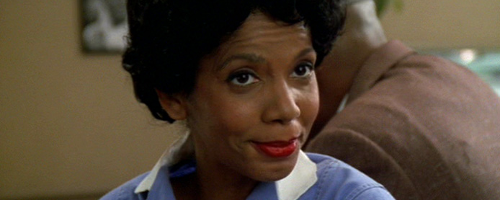
Kasidy is career-focused, and will take an opportunity from the Bajorans even if Ben isn’t sure yet about the arrangement. While Ben doesn’t like the historic inaccuracies of Vic’s, Kasidy encourages him to see the re-creation as the way things should have been, rather than the way things actually were—personally, it inspires her to remember that she is no longer bound by limitations. Even the 50s fantasy version of Kasidy is focused on achieving a better life for herself and Ben.
Kasidy senses there’s something more to Ben’s mission to beat the Vulcan captain at baseball, and eventually digs the secret out of him. She then reveals the vendetta to the rest of the crew, because she knows it will inspire them to train harder. She loves Ben’s dreams of a future life together in a home on Bajor, and jokes about the crusty old man she sees him turning into. When Ben ends up vanishing with the Prophets, she holds on to the hope that he will return one day.
Tertiary Function: (Se) Extraverted Sensing, “The Kitchens”
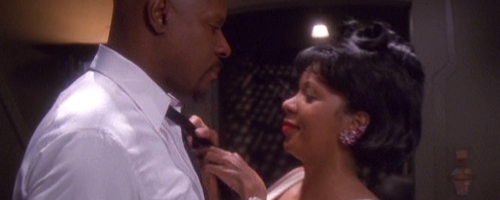
Kasidy is quick to take action on what she wants and the opportunities she’s given—in just a day or two, she goes from accepting a new job to moving into her own quarters on the station. She could have gone into a career in Starfleet, but she doesn’t love the minutae of paperwork. She enjoys the campy fun of Vic’s lounge, throwing herself into the role of flirty gambler when the crew pulls off a heist, and she and Ben first bond over their love of the sport of baseball. She decides on the spur of the moment to try cooking for Ben to cheer him up, but ends up burning his homegrown peppers (he forgives her, but keeps her out of the kitchen from then on).
When Ben worries that her ship will be heading through Jem’Hadar territory, she says they’ll have to catch her first.
Inferior Function: (Fi) Introverted Feeling, “The Deep Well”
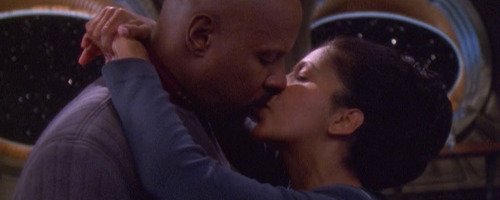
Kasidy and Ben sometimes miss each other on emotional communication, but they do try. He’s an Fi-dom who keeps things to himself unless pressed, and she’s an Fi-inferior who has to apply effort to work through any situation involving feelings. When she briefly joins the Defiant on a mission, she knows Ben is uncomfortable with her presence, but she can’t get him to admit it.
Kasidy won’t turn down the job offer from the Bajorans just because it upsets Ben. And once he apologizes, she makes him wait to kiss her again. She leaves him when he changes his mind about their marriage based on the Prophets’ influence, and only comes back once she makes him promise that he means it this time. She doesn’t relate to Ben’s moral objections to Vic’s, but tries to sympathize with his position. She’s unapologetic about her activities with the Maquis—it’s a personal conviction that she sticks by.
She certainly doesn’t blame Ben for what he has to do as a result of her smuggling. She understands the concepts of responsibility and duty, and so does he. Once she returns from her brief stint in prison, their relationship continues virtually unchanged—they have a romantic bond that neither can let go of, even when separated by different planes of existence.

